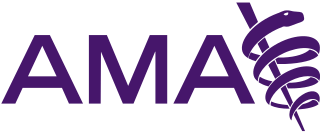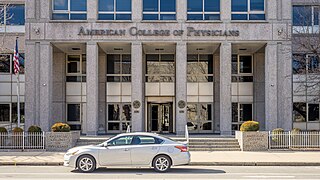
Emergency medical services (EMS), also known as ambulance services or paramedic services, are emergency services that provide urgent pre-hospital treatment and stabilisation for serious illness and injuries and transport to definitive care. They may also be known as a first aid squad, FAST squad, emergency squad, ambulance squad, ambulance corps, life squad or by other initialisms such as EMAS or EMARS.

Assisted suicide – sometimes referred to as medical aid in dying – means a procedure in which people take medications to end their own lives with the help of others, usually medical professionals. The term usually refers to physician-assisted suicide (PAS), which is an end of life measure for a person suffering a painful, terminal illness. Once it is determined that the person's situation qualifies under the physician-assisted suicide laws for that location, the physician's assistance is usually limited to writing a prescription for a lethal dose of drugs.

The American Medical Association (AMA) is an American professional association and lobbying group of physicians and medical students. Founded in 1847, it is headquartered in Chicago, Illinois. Membership was 271,660 in 2022.

Primary care is the day-to-day healthcare given by a health care provider. Typically this provider acts as the first contact and principal point of continuing care for patients within a healthcare system, and coordinates other specialist care that the patient may need. Patients commonly receive primary care from professionals such as a primary care physician, a physician assistant, a physical therapist, or a nurse practitioner. In some localities, such a professional may be a registered nurse, a pharmacist, a clinical officer, or an Ayurvedic or other traditional medicine professional. Depending on the nature of the health condition, patients may then be referred for secondary or tertiary care.
The Association of American Medical Colleges (AAMC) is a nonprofit organization based in Washington, D.C. that was established in 1876. It represents medical schools, teaching hospitals, and academic and scientific societies, while providing services to its member institutions that include data from medical, education, and health studies, as well as consulting. The AAMC administers the Medical College Admission Test and operates the American Medical College Application Service and the Electronic Residency Application Service. Along with the American Medical Association (AMA), the AAMC co-sponsors the Liaison Committee on Medical Education (LCME), the accrediting body for all U.S. MD-granting medical education programs.

The American College of Emergency Physicians (ACEP) is a professional organization of emergency medicine physicians in the United States. ACEP publishes the Annals of Emergency Medicine and the Journal of the American College of Emergency Physicians Open.
Single-payer healthcare is a type of universal healthcare in which the costs of essential healthcare for all residents are covered by a single public system.

The American College of Physicians (ACP) is a Philadelphia-based national organization of internists, who specialize in the diagnosis, treatment, and care of adults. With 161,000 members, ACP is the largest medical-specialty organization and second-largest physician group in the United States, after the American Medical Association. Its flagship journal, the Annals of Internal Medicine, is considered one of the five top medical journals in the United States and Britain.

Blue Cross Blue Shield Association, also known as BCBS, BCBSA, or The Blues, is a United States-based federation with 34 independent and locally-operated BCBSA companies that provide health insurance in the United States to more than 115 million people as of 2022.

The University of Vermont Medical Center (UVMMC) is a five-campus academic medical facility under the corporate umbrella of the University of Vermont Health Network that is anchored by a 562-bed hospital in Burlington, Vermont. UVMMC is based in Burlington and serves as both a regional referral center and a community hospital. The hospital was formerly known as the Medical Center Hospital of Vermont and later as Fletcher Allen Health Care until getting its current name. It is affiliated with the University of Vermont's Robert Larner College of Medicine and its College of Nursing and Health Sciences.
The American Society of Addiction Medicine (ASAM), founded in 1954, is a professional medical society representing over 7,000 physicians, clinicians and associated professionals in the field of addiction medicine. ASAM is dedicated to increasing access and improving the quality of addiction treatment, educating physicians and the public, supporting research and prevention, and promoting the appropriate role of physicians in the care of patients with addiction.

Danbury Hospital is a 456-bed hospital in Danbury, Connecticut serving patients in Fairfield County, Connecticut, as well as Westchester County and Putnam County, New York.

Alpha Kappa Kappa (ΑΚΚ) is a medical school fraternity that was founded in 1888 at Dartmouth Medical School. AKK had over sixty chapters at various medical schools throughout the United States and Canada for approximately eighty years but now operates with two independent, local chapters.
The California Medical Association (CMA) is a professional organization based in California that advocates on behalf of nearly 50,000 physicians in legislative, legal, regulatory, economic, and social issues. The organization was founded in 1856 and is a member of the American Medical Association.

The Pennsylvania Medical Society is a democratic organization governed by its physician members, founded in 1848. It represents physicians in public venues including the government, insurance companies, and the media; provides members with timely information, expert services, and professional support on medical practice issues; advances public health, public policy, medical science, education, and ethics; and advocates for patients.
Sorrell v. IMS Health Inc., 564 U.S. 552 (2011), is a United States Supreme Court case in which the Court held that a Vermont statute that restricted the sale, disclosure, and use of records that revealed the prescribing practices of individual doctors violated the First Amendment.
Doctors for Drug Policy Reform, or D4DPR is a 501(c)(3) non-profit organization that serves as a global voice for licensed health professionals and scientists advocating for evidence-based drug policies and best practices that advance public health, reduce stigma, and minimize harm. D4DPR leverage the expertise, compassion, and influence of licensed health professionals to enact changes in drug policy necessary to improve public health, human rights, social justice, and consumer protections. D4DPR, formerly DFCR, was founded in 2015 by David L. Nathan. In 2021, Dr. Bryon Adinoff, an addictionologist, researcher, and editor-in-chief of the American Journal of Drug and Alcohol Abuse succeeded Nathan to become D4DPR's second president.
Act 39 of 2013 established the U.S. state of Vermont's Patient Choice and Control at End of Life Act, which legalizes medical aid in dying with certain restrictions. Vermont was the first state to enact this Law through legislative action; it permits some terminally ill patients to determine the time of their own death.

Donly C. Hawley was an American physician and politician in Burlington, Vermont. A nationally recognized expert in the field of colorectal surgery, he was an attending surgeon at several Burlington-area hospitals and a frequent contributor to numerous medical journals. A Republican, among the offices in which he served was mayor of Burlington (1901-1903) and member of the Vermont Senate (1917-1919).












